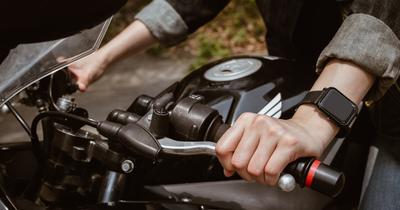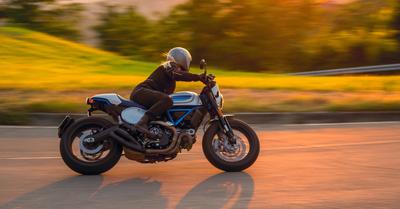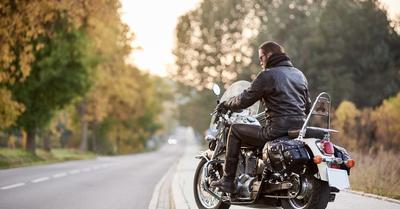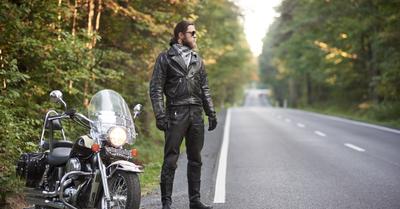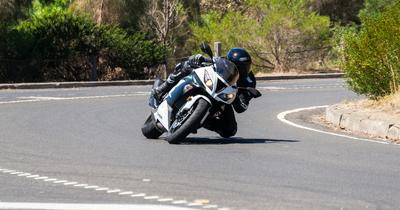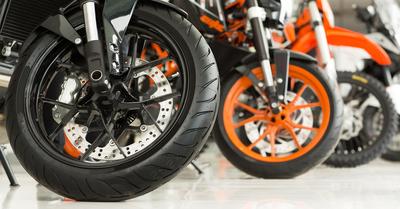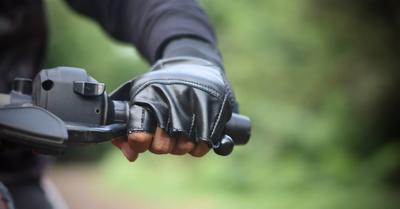What Causes Sticky Handlebar Grips?
Even everyday use can create the issue of sticky motorcycle grips. Exposure to the sun and constant pressure from your hands contribute to the breakdown of the compound used to make the grips. While companies are constantly tweaking their formulas by mixing them with new polymers and synthetic rubbers, they simply haven’t found a way to keep handlebars from getting sticky.
The more exposure your bike has to the sun and harmful UV rays, the more the handlebar grips will break down. (The same principle applies to your bike’s tires). To help keep your grips in as good of shape as possible, regular cleaning and maintenance are needed.
Every time your hands grip the handlebars of your bike, they transfer all kinds of body sweat and oils to the rubber. Since most rubber compounds are porous, they tend to absorb the items they come in contact with. That means your handlebar grips are like environmental magnets, pulling grease and dust from the road, sweat from your hands, and UV rays from the sun, and every one of these things acts to break down the rubber even further.
Many motorcycles have heated grips (shiny black) that lend themselves to absorbing heat. The grime is usually worse on this style of biker grips. The residue on heated handlebars just hardens the debris and oils, making cleaning motorcycle grips much harder. Regular sprucing with cleaning wipes can help keep the sticky rubber from becoming a mess later on.
Some motorcycle owners wear gloves, so they don’t have to deal with sticky bike grips. (Stick grips can help glove wearers enhance the firmness of their grip strength). Some owners cover their gloves with a sticky spray to improve their grip. If you use this spray, use it on the gloves, not the grips, and never on your skin.
How To Fix Sticky Handlebar Grips
Assuming you are a motorcycle owner who doesn’t care for sticky grips, there are various cleaning methods to use on your handlebars.
Thoroughly Clean Your Bike Grips
The first thing that you should do is give your bike a thorough cleaning with a pressure washer. A simple soap solution with warm water can help remove much of the grime and sweat buildup over months of storage or use. A light scrubbing of the handlebar grips can help loosen any stubborn residue that might linger. Allow the bike grips to dry completely and test them to see if they are still sticky.
Use a Degreaser or Rubbing Alcohol
Many motorcycle owners review their handlebar grips with alcohol cleaning wipes or a basic degreaser. The degreaser has chemical compounds that work on stubborn grime and can be easily applied and rinsed. Rubbing alcohol can be applied easily, and since it absorbs water, it tends to bond with any sweat molecules. Most alcohol residue quickly evaporates. Rubbing alcohol doesn’t damage chrome or glass and can be wiped on without streaking anything.
(Note that if you have leather grips, you will want to use a leather cleaner specifically made for the material. It is never a good idea to use rubbing alcohol or household degreasers/cleansers as they tend to dry out the leather).
Use Diluted Dish Soap
An inexpensive solution to sticky bike grips is to dilute household dish soap and apply it liberally to the handlebars. Many dish soaps have degreasers built into their formulas (some work better than others). Be sure to rinse thoroughly after allowing the dish soap to sit for a moment because a lot of them can leave a filmy residue that will transfer to your hands.
Use Lighter Fluid or Silicone Spray
An old trick for restoring sticky rubber grips is to wipe them down with lighter fluid or spray silicone spray on them. While debate is on the value of both lighter fluids and silicone sprays, both have their advocates in the motorcycle community. If you plan to use either, use some caution. Lighter fluid can damage the rubber, and silicone sprays can leave a slippery residue behind.
Use Baking Soda
Use a baking soda slurry and a toothbrush to remove stubborn stains and particularly nasty grime spots. Use a baking soda slurry solution and a toothbrush. The baking soda has an abrasive quality, which, combined with the bristles of the brush, can help loosen the particles of dirt and debris that have found a way to stick to the motorcycle grips. Be sure to wipe off any baking soda product after use, and don’t scrub too hard. (You don’t want to damage the rubber compound).
How Should You Replace Your Handlebar Grips?
Assuming that you have tried all the above remedies and none of them work, you might just need to replace your sticky bike grips. Motorcycle grips can vary in price, shape and color, so you must research before buying a pair. (The easiest solution is to replace them with OEM parts. Prices vary from less than $100 to over $250, depending on the bike).
Remove the Old Grips
Some grips have a weighted mounting screw that must be loosened a couple of turns before allowing the grips to pop off the handlebars. Loosen the screw at the end of the handlebars a few turns and remove the grips.
If any residual glue is left on the metal of the handlebars, you will need to remove it with a product like Goo-Gone adhesive remover before installing the new grips.
Spray the Inside of the New Grips
Many owners find that spraying the inside of the new grips with silicone spray or coating them with rubbing alcohol can help them slide them onto the handlebars. Once installed, ensure there are no issues with the new grips. Test the throttle a few times.
Use Grip Glue if Needed
A product on the market can keep new handlebars from getting loose and should be applied to the inside of the new handlebars before installation. The glue has a short lifespan and works quickly if you use it.




